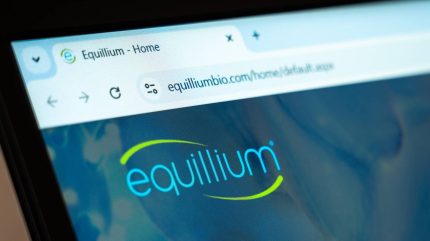
Immunobiology company Equillium has announced that it will proceed with plans to file for breakthrough therapy designation for its acute graft-versus-host disease (aGVHD) therapy itolizumab, despite missing the primary endpoint in a Phase III trial.
In the company’s ongoing Phase III placebo-controlled Equator study (NCT05263999), itolizumab was unable to reach complete response (CR) or overall response rate (ORR) higher than placebo after 29 days. However, the company insists that it still saw success in the trial with CR recorded at day 99.

Discover B2B Marketing That Performs
Combine business intelligence and editorial excellence to reach engaged professionals across 36 leading media platforms.
Investors are disappointed by the update, with the company’s stock, listed on the Nasdaq exchange, dropping 40.7% from a $0.76 close on 26 March to a $0.45 low. The stock has slightly recovered, with an expected close price of $0.48.
Despite missing its primary endpoint, the company has said it plans to file for breakthrough therapy designation before the US Food and Drug Administration (FDA) in hopes of accelerating itolizumab as a first-in-line treatment for aGVHD.
Speaking to Clinical Trials Arena, Equillium CEO Bruce Steel said: “It’s always disappointing to miss on a primary endpoint, but as we looked at the totality of the data we do believe that the longer-term outcomes were very compelling.
“We believe that these outcomes are important clinically and we achieved statistical significance in most of the later outcomes we evaluated. We know that the FDA is very focused on longer-term outcomes in this field, we have seen a lot of drugs in development or approved show near-term outcomes, but not long term.”

US Tariffs are shifting - will you react or anticipate?
Don’t let policy changes catch you off guard. Stay proactive with real-time data and expert analysis.
By GlobalDataThe double-blind trial recruited 158 adult and adolescent patients with grades III-IV aGVHD, or Grade II aGVHD with lower gastrointestinal involvement, evaluating the therapy in combination with high doses of corticosteroids typically used as standard-of-care (SOC) treatment. Patients were dosed with itolizumab within three days of the first administration of corticosteroids.
The trial was run in collaboration with the Dana-Farber Cancer Institute at Harvard Medical School.
Itolizumab is described as an anti-CD6 monoclonal antibody designed to target the CD6-ALCAM signalling pathway. Typically, aGVHD occurs when transplanted donor cells see a patient’s original cells as foreign tissue and attack them.
Research by GlobalData’s Pharmaceutical Intelligence Center estimates that if itolizumab does make it to market it is likely to bring in $17m by the end of 2026 with that figure predicted to rise to $180m by the end of the decade.
GlobalData is the parent company of Clinical Trials Arena.
Dr John Koreth, professor of medicine at the Dana-Farber Cancer Institute, said: “There are no approvals in first-line therapy for aGVHD, and no drug candidates have been able to demonstrate efficacy beyond four weeks.
“To demonstrate statistical significance in pre-specified endpoints of duration of CR and failure-free survival, compared to SOC therapy, is clinically meaningful.”
Elsewhere in the field of GvHD therapies, Orca Bio’s T-cell immunotherapy candidate for blood cancers has more than doubled the number of patients surviving free of moderate-to-severe GvHD. Meanwhile, TC BioPharm has completed subject dosing in the first cohort of the Phase IIb ACHIEVE trial of TCB008 in the UK.





